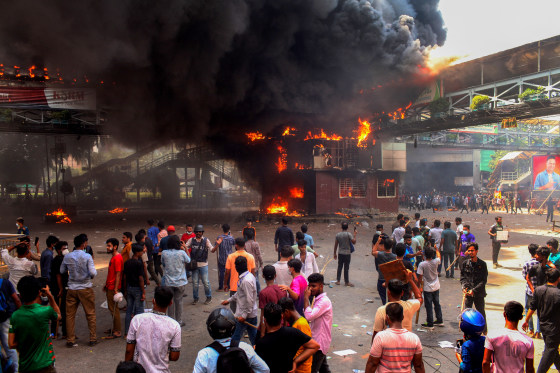In a dramatic move on Friday, the Bangladesh government enacted a sweeping ban on several major social media and communication platforms. This decision includes popular apps like Instagram, TikTok, WhatsApp, and YouTube, impacting millions of users across the nation. The restrictions are primarily focused on mobile networks, with Facebook and Telegram also facing limitations on mobile connections. This action comes in response to growing unrest and student-led protests related to quota reforms.
Here’s a breakdown of what this means for Bangladesh and why the government has chosen to impose such drastic measures.
Why Did Bangladesh Ban Social Media?

The Bangladesh social media ban is a direct response to the spread of misinformation and inflammatory content related to ongoing protests. Here’s why this action was taken:
- Unrest and Protests: The protests, which have been sparked by demands for reforms in the quota system for government jobs, have escalated into violence and civil unrest. Social media platforms have played a significant role in the organisation and dissemination of protest-related information.
- Misinformation: The government cites the proliferation of false information and rumours as a major concern. The rapid spread of unverified news has contributed to heightened tensions and confusion during these turbulent times.
- Public Safety: Authorities believe that restricting access to these platforms will help curb the spread of fake news and reduce the risk of further violence and unrest.
Impact of the Social Media Ban
The nationwide social media ban in Bangladesh has far-reaching implications:
- User Disruption: With over 120 million mobile network users in Bangladesh, the ban affects a large portion of the population. The restriction on popular apps will disrupt communication and access to information for millions of people.
- Increased VPN Use: Many users are expected to turn to Virtual Private Networks (VPNs) to bypass the restrictions. This could lead to slower internet speeds and increased network congestion.
- Economic and Social Effects: The ban could have significant economic and social impacts. Businesses that rely on social media for marketing and communication may face challenges, and the general public could be deprived of critical information and updates.
Details of the Ban
Here’s a more detailed look at the social media platforms affected by the ban:
- Instagram: A key platform for sharing photos and videos, Instagram’s suspension will impact personal and business accounts that use the platform for engagement and marketing.
- TikTok: Known for its short-form videos, TikTok is popular among younger users. Its ban will affect content creators and influencers who rely on the platform for their livelihoods.
- WhatsApp: As a widely-used messaging app, WhatsApp’s restriction will disrupt personal and professional communication.
- YouTube: The ban on YouTube will limit access to a vast array of video content, including news, entertainment, and educational resources.
- Facebook and Telegram: While these platforms remain accessible through some connections, the restrictions on mobile access will limit their effectiveness for communication and organisation.
Global Reaction and Potential Consequences
The global community is watching closely as Bangladesh implements this ban. Here’s what could happen next:
- International Criticism: The ban has already drawn criticism from human rights advocates and international organisations. Concerns about freedom of expression and access to information are central to the debate.
- Government Response: The Bangladesh government may face pressure to lift or modify the ban if it leads to significant public backlash or if it is deemed to infringe on fundamental rights.
- Future Protests: The ban could either quell unrest by reducing the spread of provocative content or exacerbate tensions if people perceive it as an attempt to stifle dissent.
What Can Users Do?
For those in Bangladesh trying to navigate the ban:
- Use VPNs: As mentioned, VPNs can help bypass restrictions. However, they may slow down internet speeds and can be blocked by the government.
- Seek Alternative Sources: Stay informed through alternative news sources and traditional media outlets that are not affected by the ban.
- Stay Safe: In times of unrest, it’s crucial to stay safe and adhere to local regulations and advisories.
Conclusion
The Bangladesh social media ban represents a significant move by the government to control the spread of misinformation and manage the ongoing protests. While the intentions may be to restore order and public safety, the implications for communication, business, and freedom of expression are profound. As the situation develops, it will be important to monitor how this ban affects both the local population and the broader global response.


